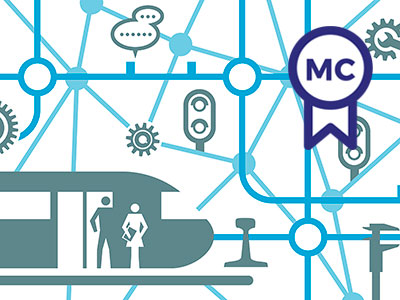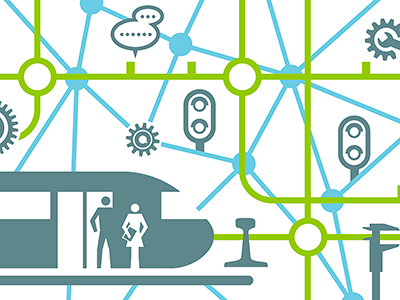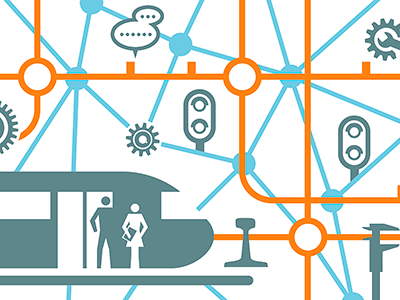Overview
Course video
Discover the science and complexity of railway systems, including how their efficiency depends on the alignment of all their components.
Have you ever wondered what it takes to get your train on the right platform at the scheduled time every day?
Journey with us into the world of rail - a complex system that connects people, cities and countries.
Railway systems entail much more than a train and a track. They are based on advanced technical and operational solutions, dealing with continuously changing demands for more efficient transport for both passengers and freight every day. Each system consists of many components that must be properly integrated: from trains, tracks, stations, signaling and control systems, through monitoring, maintenance and the impact on cities, landscape and people. This integration is the big challenge and the source of many train delays, inconvenient connections and other issues that impact our society.
This engineering course attempts to tackle those issues by introducing you to a holistic approach to railway systems engineering. You will learn how the system components depend on each other to create a reliable, efficient and state-of-the-art network.
We will address questions such as:
- How do railways work and how did they evolve over time?
- How do different components of the railway system interact?
- What is the effect of railways from an urban, social and economic point of view?
- What can be done to improve the monitoring and maintenance of tracks?
- How are timetables designed in a way that balances passenger demand with the capacity of the railway and is adaptable to handle unexpected disturbances?
- How to prevent and deal with disturbances caused by external factors?
- How does the design of railways influence their performance over time?
A new serious game has been designed for this course to guide you through the process of decision making while building a rail network and maintaining it. Cities have to be connected in an ever-changing setting, dealing with wear, capacity, developments and disturbances. How will your choices affect the performance of the system?
What you'll learn
- Identify the name and function of the main railway network components
- Evaluate the influence that railways exert on their environment and vice versa
- Explain the different methods of train control and their effect on timetabling and safety
- Understand the effects and the internal and external factors of disturbances on railway operations
- Identify the different methods of dealing with system degradation and the effects of interaction between the components
- Explore the state-of-the-art and future developments of railway systems
Are you an expert in the field?
While this MOOC introduces different aspects of the railway network, if you want to go into more detail, gain advanced knowledge and expertise for your daily work, you can enroll in our follow-up online professional education courses.
- For more information see our Professional Certificate Program on Railway Engineering.
Details
This first ever MOOC on railway systems engineering is delivered by the renowned experts of TU Delft and leading professionals working in the industry. It combines theoretical knowledge with practical examples, with the main objective to maintain a high degree of reliability under predictable and unknown circumstances.
If you want to learn about the science behind the exciting world of railway systems - whether train, metro or tram - this course will set you on the right track!
License
Unless otherwise specified, the Course Materials of this course are Copyright Delft University of Technology and are licensed under a Creative Commons Attribution-NonCommercial-ShareAlike 4.0 International License.
Qualifications
Chartered Engineering Competences
All our online courses and programs have been matched to the competences determined by KIVI’s Competence Structure, a common frame of reference for everyone, across all disciplines, levels and roles.
These competences apply to this course:
- A1: Extend your theoretical knowledge of new and advancing technologies.
Admission
This is a Massive Open Online Course (MOOC) that runs on edX.


